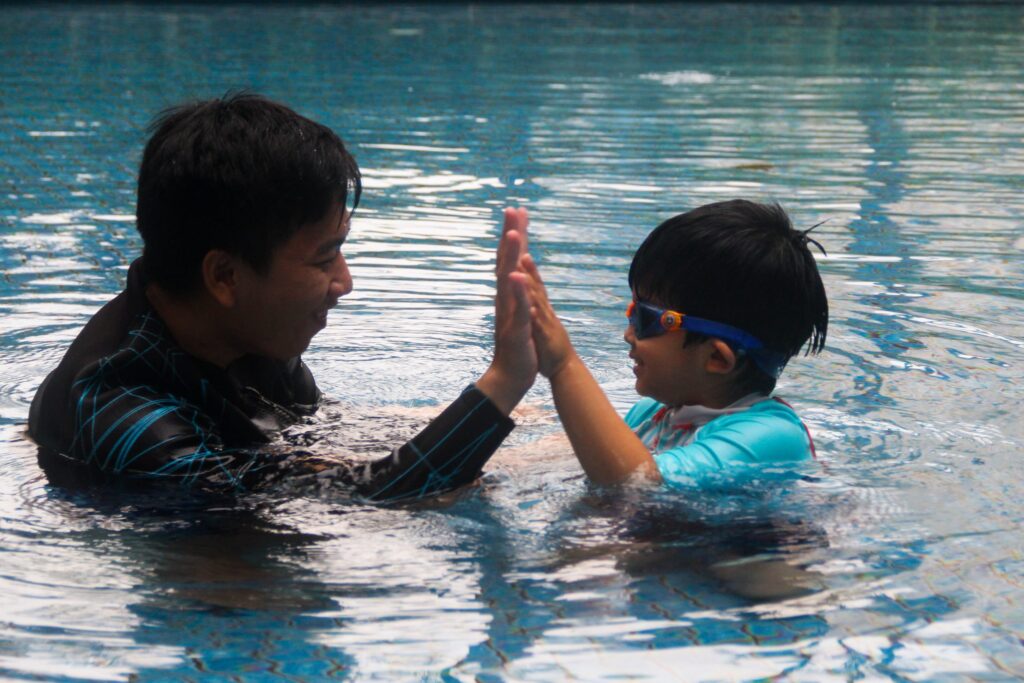The Best Age to Start Swimming Lessons: Expert Advice for Parents
The Best Age to Start Swimming Lessons: Expert Advice for Parents April 27, 2025 Introduction: When Is the Right Time...
Penguin Swim School | best swimming school in Singapore | expert swimming lessons in Singapore

Swimming is often viewed as a fun and refreshing activity, especially during the warm summer months. But beyond the joy of splashing in the pool or beach lies a deeper, more important truth: swimming is a critical life skill every child should learn. Drowning is one of the leading causes of accidental death among children worldwide. In Australia alone, an average of 20 children under the age of 5 drown each year. These tragedies are preventable—and one of the most effective prevention methods is teaching children how to swim from an early age.
Whether you’re a parent, caregiver, educator, or student, understanding the importance of swim education can literally save lives. In this blog, we’ll explore why learning to swim is non-negotiable for children, the long-term benefits it offers, and how programs like Penguin Swim School are making a difference.
Drowning can happen in seconds, often silently, and without warning. Teaching a child how to swim reduces their risk of drowning by up to 88%, according to the CDC. Basic water survival skills like floating, treading water, and safe entry/exit techniques empower children to stay calm and safe in unexpected situations.
Children who start learning to swim early (as young as 6 months) tend to be more comfortable in the water and acquire skills faster. Swim lessons tailored for young learners ensure a fun yet structured approach to safety.
Swimming engages almost every muscle group. It improves cardiovascular health, builds muscle tone, and increases flexibility and coordination. For kids, it’s a great way to stay active without putting stress on growing joints.
Swimming requires concentration, rhythm, and breathing control. These elements promote mental focus and emotional regulation. Kids who swim regularly show improved sleep patterns, reduced anxiety, and higher self-esteem.
Research indicates that children involved in swim programs often reach developmental milestones earlier than their non-swimming peers. Problem-solving, listening, and memory skills all get a workout in the pool.
Mastering new swim skills gives kids a huge confidence boost. Whether it’s floating for the first time or swimming a lap, these achievements foster a sense of capability that spills over into school and life.
Group swimming lessons teach kids how to follow instructions, cooperate, and wait their turn. These social lessons are crucial for school readiness and developing empathy.
Swimming isn’t just about fun—it involves following rules, practicing safety, and listening closely. These habits promote responsibility and attentiveness in children.
Once learned, swimming becomes a skill that stays with you for life. Early training lays a strong foundation for lifelong safety and confidence around water.
Knowing how to swim opens opportunities for sports like surfing, diving, rowing, and triathlons. It’s a stepping stone to exploring other water-based adventures safely.
Studies have shown that kids who take swim lessons often perform better in reading, writing, and math. The structure and discipline of lessons contribute to better classroom behavior and academic performance.

Certified instructors
Small class sizes
Age-appropriate curriculum
Clean and safe facilities
Positive, engaging environment
Penguin Swim School is renowned for its child-focused teaching methods, warm and welcoming instructors, and commitment to water safety. Whether your child is a complete beginner or ready to fine-tune their strokes, Penguin offers tailored programs to suit every age and ability.
They specialize in:
Parent & Baby classes
Learn-to-Swim programs
Advanced stroke techniques
School holiday intensives
Q: When should my child start swim lessons?
A: As early as 6 months! Many swim schools offer parent-baby classes to build water comfort and bonding.
Q: What if my child is afraid of water?
A: Professional swim instructors are trained to work gently with fearful kids, building trust through play and gradual skill-building.
Q: How long does it take to learn to swim?
A: Every child is different. Consistency, positive reinforcement, and regular practice make a big difference.
Learning to swim isn’t just a recreational activity—it’s a vital survival skill that could one day save your child’s life. It promotes physical health, boosts mental resilience, and nurtures emotional well-being. Whether you’re a parent thinking about swim lessons or a student researching child safety, the message is clear: swimming is essential.
Programs like Penguin Swim School are here to support families with friendly, expert instruction in a safe, encouraging environment. Don’t wait—take the first step toward water safety and give your child the gift of confidence, health, and joy in the water.
Ready to get started? Visit www.penguinswimschool.com to book your first lesson today!
🌐 Website: www.penguinswimschool.com
📞 Call: +65 8909 4656
💬 WhatsApp: https://wa.me/6589094656
📧 Email: business@penguinswimschool.com
The Best Age to Start Swimming Lessons: Expert Advice for Parents April 27, 2025 Introduction: When Is the Right Time...
Why Learning to Swim is a Lifesaving Skill Every Child Needs April 24, 2025 Introduction: More Than Just a Summer...
Top 10 Reasons to Enrol in Swimming Classes in Singapore & Malaysia April 22, 2025 Introduction: Dive into a Life-Changing...
WhatsApp us